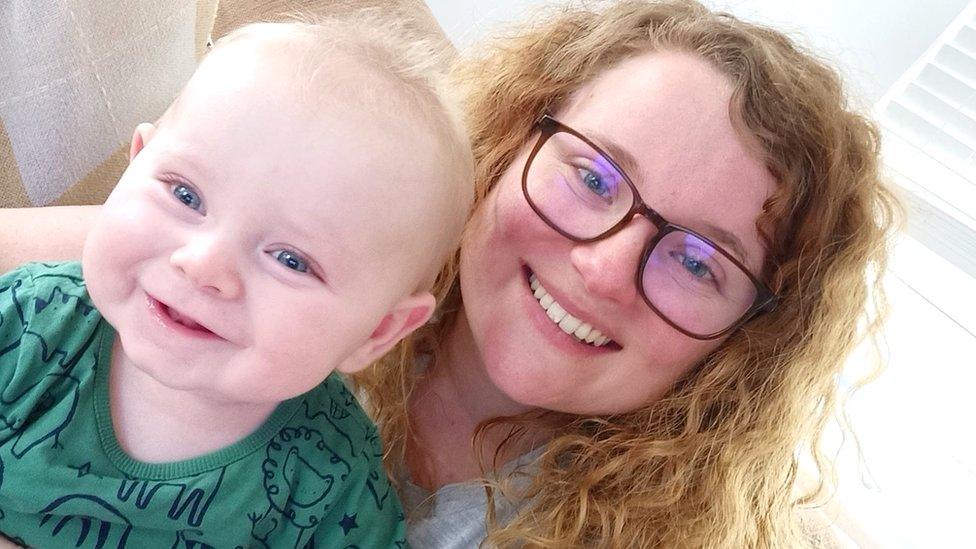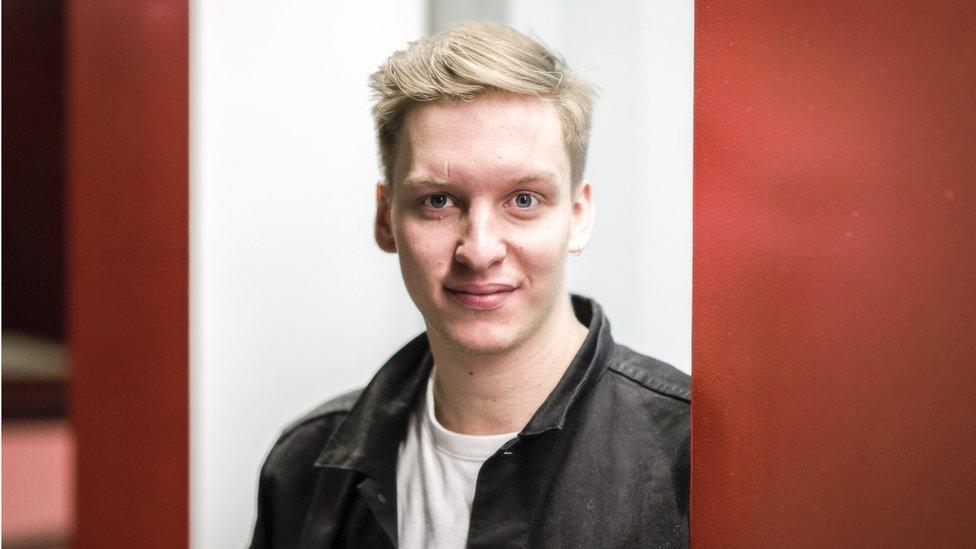OCD: How to cope over Christmas and New Year
- Published

Sam experiences "deeply upsetting" and "very, very graphic" violent and sexual intrusive thoughts and images of harming others
Over the festive period Sam Jones would love to be able to hug his mum but he's not sure if he can.
The 35-year-old is one of an estimated 750,000 people in the UK with the serious anxiety-related condition, external obsessive-compulsive disorder (OCD).
He has Harm OCD, which means he has "deeply upsetting" and "very, very graphic" violent and sexual intrusive thoughts of harming others.
Hugging some people, including his mother, can trigger those thoughts.
"The most painful thing is sometimes I really want to give my mum a hug and I can't do it and you just feel like a rubbish person because of it," he said.
"You really genuinely feel like you might cause some harm to them or something."
He said it starts with a difficult thought about hurting someone.
That can be followed by a fear that he will carry out that action.
"Then the anxiety will rise and as that rises and rises you feel compelled to perform these compulsions, to sort of quell that anxiety and keep confirming to yourself, 'I'm a good person, I'm a good person'," he explained.
Sam said he often found it difficult to hug women and children as he worries he is going to harm them.
The socialising and changes of routine at Christmas can exacerbate Sam's intrusive thoughts.
"It's going out to the shop... being around lots of people," he said.
"To spend the whole time extremely tense and just wanting to get out of there - but not wanting to get out of the room - it's really hard, it's really upsetting," he said.
"Of course you can get labelled as grumpy of a bit of a recluse and that adds to the shame that you're already feeling."
Sam does not drink alcohol.
He said: "That's something that will spike my symptoms because of that feeling of being out of control."
Getting ready for a Christmas event might also be all the more challenging for Sam. On a bad day it can take him up to 45 minutes to put a jumper on as he feels compelled to take it on and off until it feels right.
When Sam was 29 he said he hit rock bottom and felt suicidal.
At the time he was experiencing a relationship OCD and said he was repeatedly asking himself, "Am I in love? Is this real love? Am I leading this person on?"
He said "it can take over your life".
I have days where I struggle and days when it's fantastic
He went to his GP which eventually led to his diagnosis. He was treated with a form of cognitive behavioural therapy (CBT) with exposure and response prevention (ERP) and peer support groups.
Sam said he also armed himself with information from OCD Action, OCD UK and The OCD Stories podcast.
"I still have really hard days where I really struggle and I have days when it's fantastic," he said.
There are many types of OCD, most of which can be made more challenging by Christmas, Sam said.
He said for instance someone with contamination OCD, where someone obsesses over catching an illness or spreading germs, will find it hard to visit people's homes, hugging, eating food prepared by others or being in a big group.
Someone with religious OCD, where they have obsessive religious doubts and fears or unwanted blasphemous thoughts and images, cold be triggered by the religious symbolism and rituals of Christmas.
Sam has heard people using the term OCD flippantly, as a joke or in a way that trivialises the condition, something he finds "deeply upsetting".
"It affects you a very visceral level.
"If you see an Obsessive Christmas Disorder jumper or something... it just makes you feel really angry."

Craig feels compelled to carry out rituals and routines
Craig Evans, 30, from Swansea, also has OCD.
He needs everything to feel perfect or "just right" to feel comfortable.
Since his early teens he has been checking things and switching things on and off in multiples of four - he fears if he does not do this something bad will happen.
His routine involves ensuring light switches are aligned in a particular way and always putting his sock on his left foot before his right.
He was diagnosed in his mid-20s and said CBT and exposure therapy had helped.
He finds Christmas particularly challenging because of changes to his routine and seeing more people.
"Certain rituals and certain routines that I have at the moment, if they get knocked off course that can raise my anxiety levels," he said.
"It may be something trivial like I can't have my food in peace or I can't watch my favourite telly program a particular time, that raises my anxiety levels and I have to carry out the cycle with my compulsions."
He can also find other people's homes difficult.
"For example, glasses not lined up as how I'd wish them to be," he said.
"You get shaky, you get clammy, your heart races, palpitations."
Can you make Christmas and New Year easier when you have OCD?
Sam chose to keep his Christmas small, spending it with just three other people.
He will be focusing on being in the moment, taking walks in nature, exercising and being with his fiancée.
He said the best way to help someone with OCD have an easier Christmas is to educate themselves about the conduction.
Craig also likes to keep things as simple as possible at Christmas.
"If I was to attend lots of different parties and go out and visit a lot I'd find that very difficult to cope with," he said.
He said others could help by accepting there may be times when the person with OCD is not quite themselves.
In support groups Craig said had heard of one person with OCD intentionally overcooking Christmas dinner for fear of poisoning their family.
Another spent Christmas day obsessively cleaning their kitchen.
"The worst thing you can say to them is 'just stop it' - that trivialises it," he said.
"To you it might be ridiculous but to that person that's suffering in that moment it's a very, very distressing."
- Published17 June 2022

- Published1 September 2020

- Published18 March 2021
